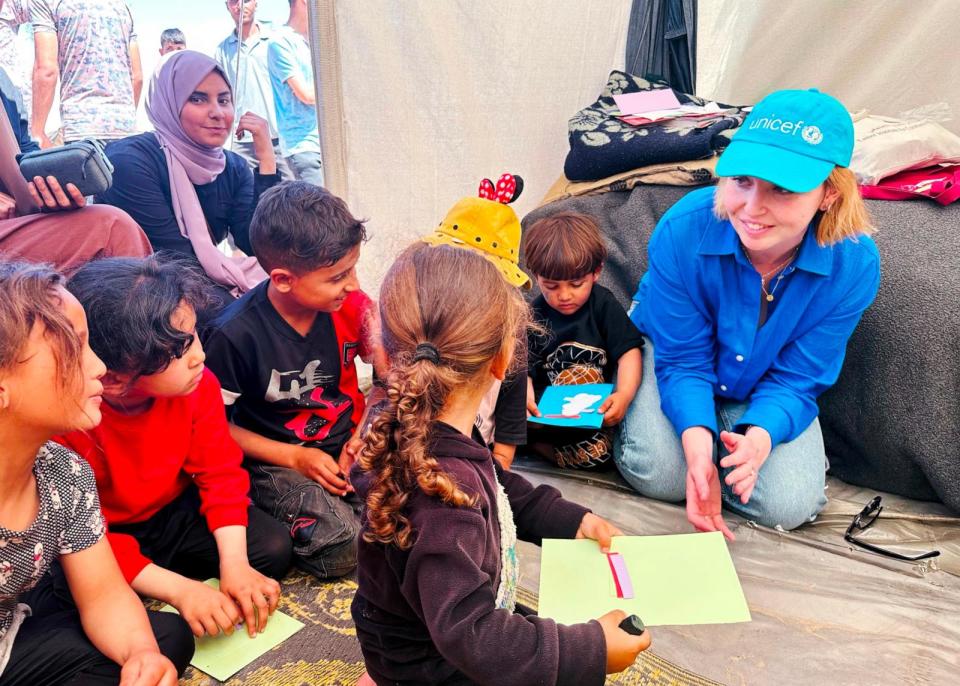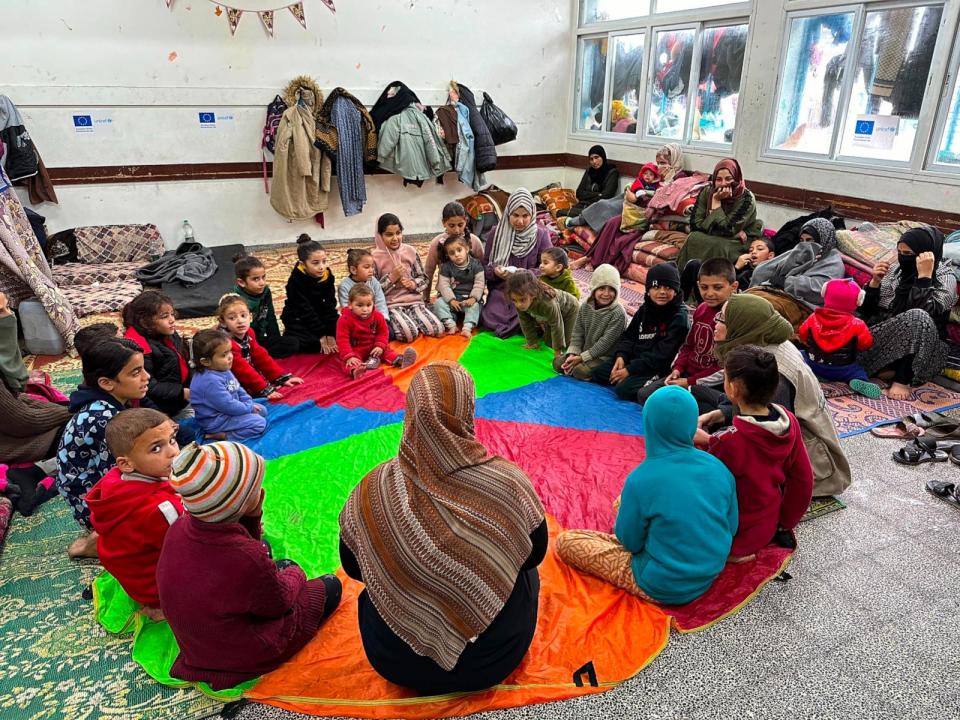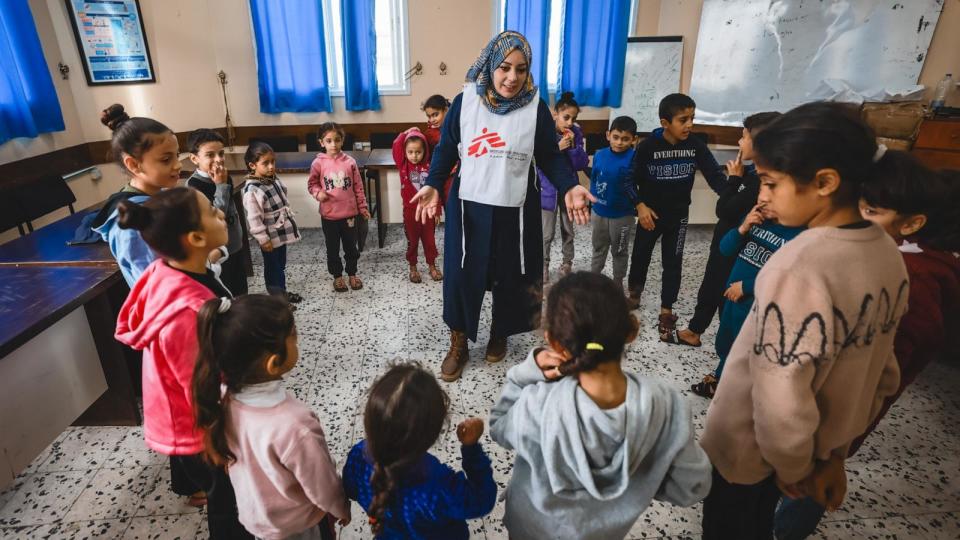Inside Gaza's mental health crisis impacting civilians, aid workers: 'Catastrophic'
A "catastrophic" mental health crisis has unfolded in Gaza, affecting both civilians and humanitarian workers, amid the ongoing Israel-Hamas war, according to international aid organizations.
Since Hamas launched a surprise terrorist attack in Israel on Oct. 7, 2023, and Israel responded by declaring war, more than 35,173 people have been killed in Gaza and more than 79,061 have been injured, according to the Hamas-run Gaza Ministry of Health. More than 1,700 Israelis have been killed and more than 8,700 have been injured, according to Israeli officials.
The physical toll of the war has been documented in photographs and videos with Gazans suffering from severe injuries, including the loss of limbs, and malnutrition due to the shortage of food and clean water, as well as a "full-blown famine" that has struck northern Gaza.
But the war has taken a mental and emotional toll too, with fear and anxiety gripping adults and children alike and hidden scars that will likely last for decades, aid workers told ABC News.
MORE: 4 children injured in Gaza amid Israel-Hamas war arrive in US for medical treatment
They added that if Israel launches a full-blown ground offensive in Rafah, the city on the Gaza-Egypt border, the humanitarian effort, including the mental health response, will likely collapse.
The mental health crisis is "already catastrophic … and it keeps getting worse and worse," Dr. Audrey McMahon, a psychiatrist with Doctors Without Borders, or Médecins sans Frontières (MSF), who was the mental health activities manager based in Jerusalem until March, told ABC News. "Gaza has become an unlivable place. It's just unfathomable. The foundation of mental health is security, is safety, something that you can predict; they don't have that."
Studies show mental health effects of war
There is not much data documenting the mental health crisis among Gazans during the war, but studies of past conflicts have shown the effects of living in war-torn areas.
At least 10% of those who experience traumatic events in armed conflict will have serious mental health problems and another 10% "will develop behavior that will hinder their ability to function effectively," according to the World Health Organization in a review of research findings.

The most common conditions experienced are anxiety, depression and psychosomatic problems including insomnia and back and stomach aches, the WHO said.
In a study that looked at the psychological consequences of war trauma on women in Bosnia and Herzegovina, researchers found those exposed to serious war and traumatic events experienced more post-traumatic symptoms.
Another joint U.K.-Croatia study from 2017 looking at severe war-related trauma found that those exposed to such trauma were at risk of "interpersonal dysfunction 15 years after people were exposed to an armed conflict."
Most recently, a study published in The Lancet found in the first month of the Russian-Ukrainian war in March 2022, the first survey of Ukrainians' mental health showed 53% of Ukrainian adults were experiencing severe mental distress, 54% were experiencing anxiety, and 47% were experiencing depression. Six months into the war, 26% of parents still in Ukraine had post-traumatic stress disorder (PTSD), and 15% had developed complex PTSD.
In one of the only estimates available, the United Nations Children's Fund (UNICEF) says it believes almost all children in Gaza are in need of mental health and psychosocial support. Children under age 15 make up half of Gaza's population of 2.2 million people, according to the Population Reference Bureau.
Aid workers say Gaza is different than other regions of armed conflict because there are no safe zones and, unlike other war-torn areas, few people have been allowed to leave.
"Children have experienced not just one traumatic event, but what we call compound trauma, so traumatic event after traumatic event," Tess Ingram, a UNICEF spokesperson who was in Gaza three weeks ago, told ABC News. "And that's something we rarely, if ever, see because if you think about another conflict, a child might experience a traumatic event and then be able to flee to safety. But in the case of Gaza, children are trapped, and there's nowhere for them to go that is safe."
'A breach of childhood'
Because children make up such a large portion of Gaza's population, they have been disproportionately affected by the war and, in turn, the mental health crisis, experts said.
MORE: Protesters in Israel arrested after attacking Gaza aid trucks
Davide Musardo, a psychologist and mental health activity manager for MSF currently in Rafah, said during one of his first days at the Rafah Indonesian Field Hospital, he came across a 10-year-old girl who had experienced burns due to the heavy fighting and screaming that she couldn't breathe.
"She was clearly in a panic attack," he said. "We start[ed] to recognize that every time that she has to do medical care, she was experiencing the pain of what she lived."
Musardo said he's seen many children in Gaza have acute stress reactions, suffering from panic attacks or screaming even if they are sedated. Other children may be so traumatized by what they have experienced, such as the loss of a parent, that they will shut down and not express any type of emotion, he said.
Ingram said during her most recent trip to Gaza in April, parents told her their children were becoming withdrawn: speaking less, playing less and sleeping less.
"That is describing a higher level of anxiety among their children, who had -- in many cases -- been displaced several times and understood that where they were currently wasn't safe," she said.
She said she met one boy, about age 9 or 10, at a hospital in Rafah who, during a previous military operation, had been badly injured and lost his father. Since that incident, he has not spoken much. The boy had been diagnosed with depression and PTSD, and his sister, a young woman in her early 20s, was the one explaining the boy's condition to Ingram.

For adults experiencing mental health issues, the main intervention is talk therapy, but, for children, Musardo said the main goal is to make their lives feel as normal as possible. He said his team at MSF mainly organizes play-based activities for children such as parties, listening to music and watching movies.
For the child who was screaming that she couldn't breathe, Musardo said he started to work and play with her, giving her a nurse's uniform and a doctor's pen, calling her "doctor" as a way to try and control her panic attacks. He said that as the days passed, she was able to calm herself down and experience fewer panic attacks.
McMahon said one team at MSF also wrote a storybook on grief and how to deal with grief when losing so many family members and friends.
"When we're able to offer a space, like ... a safe space to play, we do that a lot with younger patients," she said. "It's not always possible to play. Some children are not able to play anymore, and that's a very worrying sign for their development, for their mental health, and they haven't been to school in six months. It's just the breach of childhood, really."
Aid workers' mental health also worsens
Gaza's health care workers have also seen their mental health suffer over the past seven months. Many have been risking their lives to provide medical care, often with limited supplies.
McMahon said many MSF medical staff in Gaza are working under intense psychological strain. Some have been trapped in hospitals during Israeli raids and have to decide whether to leave patients behind or save their own lives, leading to feelings of distress and guilt.
MORE: Gaza aid timeline: How the hunger crisis unfolded amid the Israel-Hamas war
"They are in an impossible situation," said McMahon. "Depending on who you talk to, they both feel like they are somehow heroes in the sense of doing the impossible and yet still offering care, but, at the same time, they are put in situations where they need to make choices that are extremely difficult."
She continued, "Like, do you choose between someone coming with an open wound bleeding that you need to do surgery quickly, or a child that is acutely malnourished and struggling to stay alive? And, like, both are in a dire situation. Who do you choose? And they are faced with that all the time."
Musardo said he has seen medical staff affected while treating patients during the war and part of his role is to provide support, both in giving them materials on how to self-care and letting them know he's there if they want to talk. He said staff members often come see him during the night shifts in the hospital, when it is calmer.
Many medical workers in the area are Gazans themselves and, therefore, are suffering from the same problems as many civilians.

McMahon said one staff member reported they couldn't go to work one day because they hadn't been able to find food or water for their children for the past three days and needed to prioritize searching. "That's the situation of medical staff," she added.
Looming threat of Rafah invasion
The Israel Defense Forces (IDF) dropped leaflets and sent text messages in Arabic on May 6, calling for about 100,000 people to evacuate the eastern part of Rafah and to head north to the Al-Mawasi humanitarian corridor as airstrikes began. Since then, nearly 600,000 people have evacuated Rafah, the U.N. said Wednesday.
The U.S. has assessed Israel has amassed enough troops on the edge of Rafah to move forward with a full-scale incursion into the city, but the U.S. is not sure if Israel has made a final decision to actually do so, two U.S. officials told ABC News on Wednesday.
If Israel does launch a full-scale incursion in Rafah, it will be "catastrophic for mental health," Ingram, from UNICEF, said.
"Over the past seven months, there's already been an enormous impact on children's mental health and every day that this continues to go on, it gets worse and our ability to treat children's mental health, when they're continuing to be in a situation that is unsafe, is nearly impossible," she said.
"While the fighting continues, not only does the trauma compound, but our ability to come in and try and help respond to that trauma is incredibly limited," she continued. "So, an offensive in Rafah would have an enormous impact from both of those angles, in terms of escalating the problem while continuing to limit the response."
MORE: Mental health effects of Ukraine war zone on children
Experts said their organizations and several others have been calling for a cease-fire for the fighting to end, the hostages being held in Gaza to be released and more aid to enter the strip.
Additionally, they say a cease-fire is the only way for Gazans to begin to address the emotional and mental scars they carry from the war.
"The scars, they will be long lasting and for life," McMahon said. "What has been and is still going on is utterly horrific, utterly abnormal. .... A war is potentially traumatizing for everyone. But again, the kind of systematic attacks on civilians, on children, this really impacts your view of the world, your sense of humanity, and this is extremely [difficult] to change or heal afterwards."
ABC News' Luis Martinez and Selina Wang contributed to this report.
Inside Gaza's mental health crisis impacting civilians, aid workers: 'Catastrophic' originally appeared on abcnews.go.com

